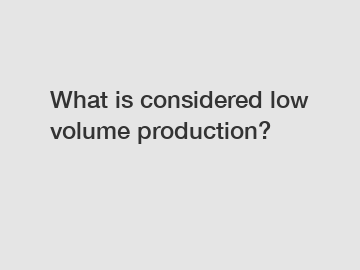What is considered low volume production?
What is Considered Low Volume Production?
In the world of manufacturing, low volume production refers to a strategy that involves producing a limited number of units for a specific product. Unlike high volume production, which focuses on mass production of goods, low volume production caters to smaller markets, niche products, or prototype testing. This article explores the concept of low volume production, the benefits it offers, and the situations in which this approach is advantageous.
Defining Low Volume Production.

Low volume production can be defined as the manufacturing process that involves producing a limited quantity of goods within a given timeframe. While there is no fixed number that determines what is considered low volume, it typically involves producing anywhere from a few dozen to a few thousand units. The specific volume may vary depending on the industry, product complexity, customer demand, or production capabilities.
Benefits of Low Volume Production.
1. Cost Efficiency: Low volume production allows manufacturers to avoid the high costs associated with large-scale production. By producing a smaller number of units, manufacturers can reduce expenses related to raw materials, tooling, equipment, and labor. It also helps to minimize excess inventory and storage costs.
2. Flexibility and Customization: Low volume production offers greater flexibility in terms of customizations and adaptations. Manufacturers can easily respond to customer demands, make product modifications, and implement design changes without disrupting a large-scale production line. This flexibility is particularly beneficial for niche products or markets with specific customization requirements.
3. Faster Time-to-Market: With low volume production, manufacturers can bring products to market more quickly. Since the production runs are smaller, there is less time required for planning and preparation. This allows for faster prototype testing, product iterations, and adjustments based on customer feedback, ensuring that the final product meets customer expectations before scaling up production.
4. Reduced Risk: When introducing a new product or testing a niche market, low volume production helps mitigate risks associated with uncertainty. By producing a smaller quantity, manufacturers can assess market demand, gather feedback, and evaluate customer acceptance before investing in larger-scale production. This approach minimizes financial risks and prevents potential losses in case the product does not meet market expectations.
Situations Favorable for Low Volume Production.
1. Customized or Specialized Products: Low volume production is ideal for products that require customization, personalization, or specialization to meet individual customer requirements. This includes products like luxury goods, custom-made furniture, or unique handcrafted items.
2. Market Testing and Validation: When introducing a new product or exploring a new market segment, low volume production can be used to gauge customer response and evaluate market potential. This allows manufacturers to make necessary adjustments and refinements based on early feedback before committing to large-scale production.
3. Niche Markets: Low volume production is commonly employed in niche markets where customer demand is limited. By producing smaller quantities, manufacturers can cater to the specific needs of niche customers without oversupplying the market or incurring excessive costs.
4. Prototyping and Research: Low volume production enables manufacturers to create prototypes for testing and research purposes. It allows for the evaluation of product functionality, market appeal, and production feasibility before making further investments in scaling up the production process.
Conclusion.
Low volume production serves as a valuable strategy in manufacturing for various reasons. The flexibility, cost efficiency, customization, and reduced risk it offers make it an attractive choice for niche markets, customized products, and market testing scenarios. By producing a limited number of units, manufacturers can better assess market demand, minimize financial risks, and refine their products before moving to larger-scale production. To learn more about low volume production or discuss your specific manufacturing needs, feel free to contact us.
If you want to learn more, please visit our website wintech-t.com, quick turn cnc machining, oem low volume plastic moulding.


